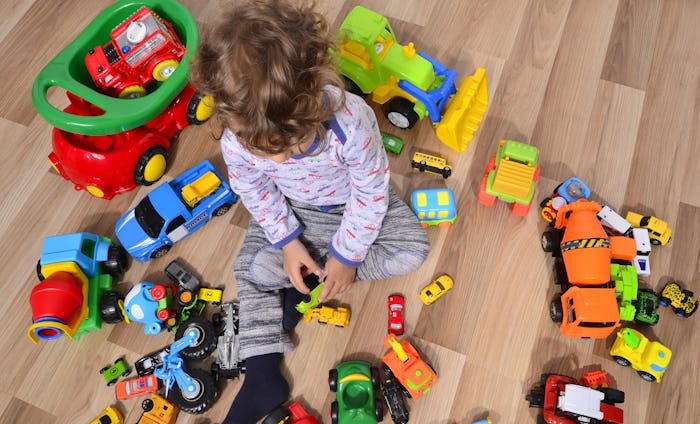Life

How To Tell If Your Kid Is Too Overwhelmed By Their Toys, Because Sometimes Less Is More
Plenty of adults love the idea of simplifying their lives with fewer possessions, as evidenced by the popularity of the minimalist movement. But can the same idea apply to kids as well? Knowing how to tell if your kid is too overwhelmed by their toys might eliminate stress from both of your lives. At some point, it's simply time to downsize the toy chest.
In fact, childcare experts caution against providing too many playthings for your little one. In many ways, the excess can make playtime less fun. "They pick up one toy, drop it, and move on. They can't focus on using any of their things to the fullest," said Margaret Sheridan, Ph.D., chair of the human development department at Connecticut College, in Parenting. This is such a shame, too, because playtime should be all about fun and learning, not stress from too many possessions.
But deciding exactly how many toys count as too many is not always easy. It depends on the kid and, thankfully, by paying attention to your child's reactions and stress levels, it's possible to strike a balance in the playroom. Ideally, your child will have enough awesome toys on hand to keep them busy, and you'll regain a little space in your home in the process.
1They're Super Distracted When Playing
Younger kids aren't exactly famed for their amazing attention spans. But children provided with fewer toys tend to engage in more focused and creative play, according to a 2018 study of toddlers in Infant Behavior and Development. Too many toys can, paradoxically, make it more difficult for kids to actually play.
2They Trash Toys Regularly
Granted, it can take a little trial and error for kids to learn that plastic toys aren't indestructible. There might be a few Shopkins casualties before the lesson really sinks in.
But when kids just have too many toys, they're less likely to care for their playthings overall. Breaking a few toys here and there may not feel like a big deal, or — yikes — it could become fun. Kids with fewer toys tend to appreciate them more, as noted in Parents. They're less likely to break the toys if there's a limited supply.
3They Complain About Boredom
Your kid has a whole room full of toys and gadgets, but still complains about being bored all the time. It's a situation that has confounded plenty of parents.
When kids have too many toys to choose from, they often get overwhelmed and end up playing with nothing, as noted by Very Well. Cutting back on the toys means your kid might have more playtime and more stimulation.
4They're Super Demanding For More Toys
Getting stuff can be addictive and, developmentally, it's pretty normal for preschoolers to want every toy they see. Their impulse control just isn't super developed yet, as noted by What To Expect, to moderation is a foreign concept. That said, it's pretty easy to get hooked on the cycle of getting more and more stuff, instead of enjoying the toys at home. Oh, and those YouTube unboxing videos absolutely do not help at all.
Of course, there's also the whole issue of advertisers preying on children who don't yet have the full ability to tell reality from fiction, let alone make wise purchasing decisions. But that's another topic for another day.
5They Fight With Siblings Constantly
When your kids are fighting, isn't it usually over a toy? Siblings with fewer toys might actually fight less, because they have less "territory" to mark, according to Joshua Becker of Becoming Minimalist. Of course, your own family's experience will vary, but scaling back the number of toys in your home just might lead to greater sibling harmony.
6They Ignore Most Single-Use Toys
So many of those bright plastic toys with sound effects and lights tend to get left in the dust soon after they're opened. "Children grow tired of them quickly. Toys should make kids think, not just press buttons," said Tom Limbert, Head Teacher of Stanford University’s Bing Nursery School of Child Development Research and Training, in Babble. Sometimes the classic toys, such as blocks or crayons, offer kids way more options for creative play.
7They Don't Know How To Play Without Toys
For some caregivers, it's important for children to learn how to get by without any toys at all. In fact, a German nursery regularly removes all of its toys for a few months, encouraging children to rely on their imaginations and social skills instead, as noted in the Independent. Learning to combat boredom through friendship and imaginative play is a pretty crucial life skill.
Check out Romper's new video series, Bearing The Motherload, where disagreeing parents from different sides of an issue sit down with a mediator and talk about how to support (and not judge) each other’s parenting perspectives. New episodes air Mondays on Facebook.